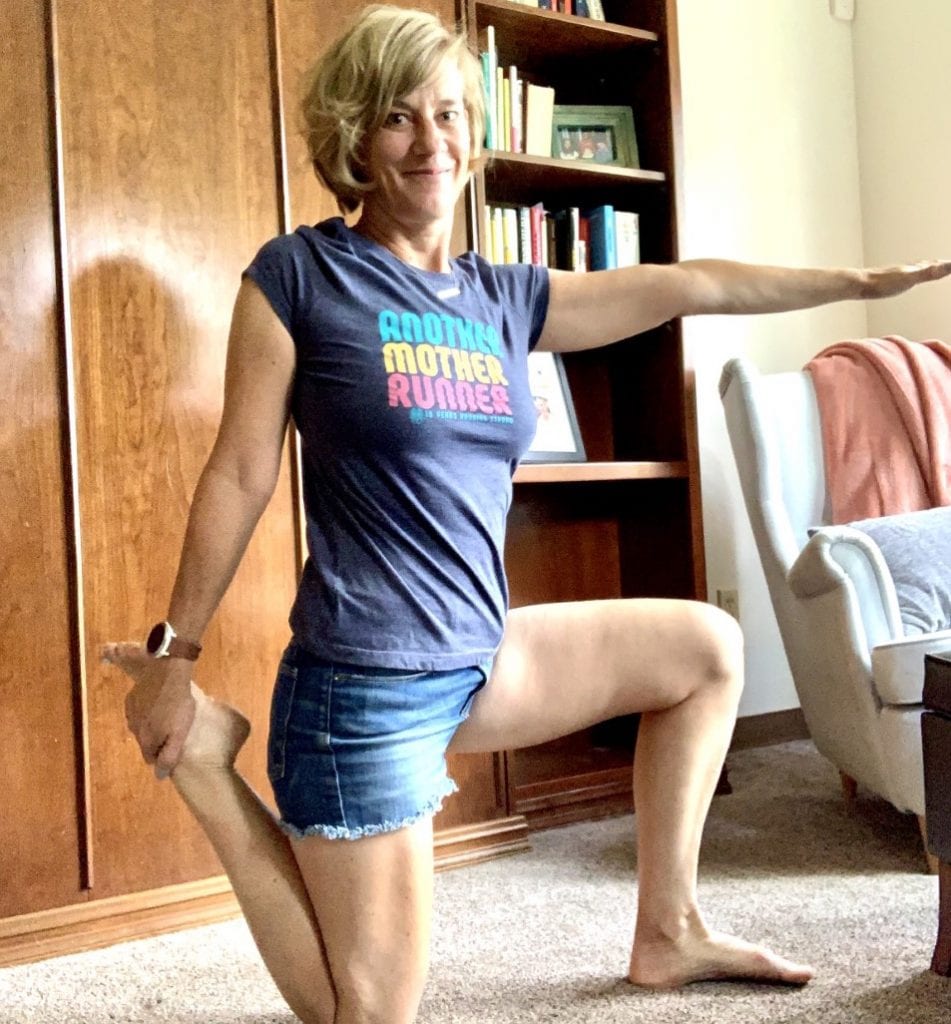
It was 3 a.m. when I calmly hopped in the back seat of an Uber. The driver turned around, confused, and said, "We're dropping you off at the emergency room?"
It was a first for both of us. I felt foolish, but this was the easiest way to get to the hospital as a young woman living alone in San Francisco. Over the past few weeks, I'd experienced a severe cough and trouble breathing. That night, my breathing was so labored that I couldn't sleep. After calling a nurse line, I was urged to go to the hospital to get it checked out.
So there I sat, completely alone in the emergency room, in a city I'd only lived in for two months. I felt even more foolish when the various tests that were done on my lungs showed nothing unusual. The doctor asked, "Has anything significant spiked your stress level recently?"
My body was trying desperately to cope with the immense changes that had taken place in every aspect of my life.
Until then, I assumed I had an odd summer cold that had morphed into something more serious. But in reality, my body was trying desperately to cope with the immense changes that had taken place in every aspect of my life. I was living in a city bigger than any place I'd lived before, while adjusting to a new role at a startup in an incredibly fast-paced environment. I hadn't given myself the time or space to process everything that had happened, and it threw my body for a loop.
I've experienced physical symptoms of stress throughout my life, though they vary from one moment to the next. Lately, I've been clenching my jaw so hard that I'll have a headache for weeks on end. Even as I tell myself to stop doing it, my bones remain locked in, just as tightly as my focus.
When these symptoms first arise, I never associate them with what's going on in my life. For some reason, my body and mind don't link up in that way - but over the last few months, I've made an effort to recognise these physical symptoms for what they are: stress.
We've all been there. You're in the middle of a chaotic week and a mountainous zit pops up your chin. You feel bloated after stress eating takeout for the fourth time this week. Your neck and shoulders ache from hunching over your laptop for too long. Your stomach, your head, your muscles, your mind ache for relief.
When my life becomes chaotic, I often stop everything and give myself over to a hellish week. I'll stay up far too late, eat out for convenience, skip a workout for more sleep, and leave my apartment a mess. Then that headache starts creeping in. My shoulder and neck muscles get a little sore. The sore throat I thought was gone is back with a new fire.
In my efforts to mitigate the effects of stress, I've learned how important routine can be. When it feels like everything is about to spin out of control, I try to lean even harder into my routine. I remind myself to slow down and stay the course. It may seem impossible to wake up an hour earlier for a quick run, but as I hop in the shower sweaty and out of breath, I feel lighter instead of exhausted. I may not feel like making a quick dinner before running off to the next event, but cooking gives me a chance to breathe, even if it's just for a moment while I wait for the water to boil.
One of the most helpful tools I've learned, though, is separating whatever's stressing me out from the rest of my life and staying present in the moment. My therapist always reminds to stay right here, instead of letting a problem swallow me whole. In the past, I would pull away from friends, stay awake overthinking, and unravel altogether.
For me, yoga has been immensely helpful in learning to hit the brakes. It takes me almost 20 minutes to let go of everything circulating in my brain, but eventually, as a focus on my breath and how my body feels, I notice my jaw unclench and my heart rate slow. Yoga may not be your thing, but I recommend finding something that helps take your mind off your stressors: another workout, a book club, or trying new recipes, for example. If you can escape these things that consume you, you'll reduce stress in the moment and minimize the long-term harm it can cause.
Of course, sometimes a solid routine or practicing self-care just won't cut it, and that's OK. If that's the case, talk to a therapist or your doctor. Asking for help is one of the best things you can do.
from POPSUGAR Health & Fitness https://ift.tt/3fyf6I1
via
babu31
 The new Closing the Gap agreement between Australian governments and the Coalition of Peaks identifies the need to address institutional racism, discrimination and unconscious bias and to embed cultural safety within government mainstream institutions and agencies. In the article below, Professor Juanita Sherwood, Pro Vice-Chancellor of Indigenous Engagement at Charles […]
The new Closing the Gap agreement between Australian governments and the Coalition of Peaks identifies the need to address institutional racism, discrimination and unconscious bias and to embed cultural safety within government mainstream institutions and agencies. In the article below, Professor Juanita Sherwood, Pro Vice-Chancellor of Indigenous Engagement at Charles […] (Introduction by Croakey) Earlier this week the Federal Government announced it is providing 10 additional Medicare-subsidised psychological therapy sessions for Australians affected by the second wave of the COVID-19 pandemic. The additional sessions are for people who have already used their initial 10 sessions through a Mental Health Treatment Plan, […]
(Introduction by Croakey) Earlier this week the Federal Government announced it is providing 10 additional Medicare-subsidised psychological therapy sessions for Australians affected by the second wave of the COVID-19 pandemic. The additional sessions are for people who have already used their initial 10 sessions through a Mental Health Treatment Plan, […] Five priority areas to improve the treatment and lives of people with head and neck cancers are highlighted in a unique new video series, reports journalist and cancer survivor Julie McCrossin. The videos also share the stories and questions of survivors, and “tell the blunt truth about how the Australian […]
Five priority areas to improve the treatment and lives of people with head and neck cancers are highlighted in a unique new video series, reports journalist and cancer survivor Julie McCrossin. The videos also share the stories and questions of survivors, and “tell the blunt truth about how the Australian […]
 The United Kingdom’s response to the COVID-19 pandemic has been widely critiqued and even Prime Minister Boris Johnson has acknowledged that it could have been handled “differently”. However, perhaps, Australia has something to learn from at least some of Johnson’s public health initiatives? That’s the suggestion from Jane Martin, Executive […]
The United Kingdom’s response to the COVID-19 pandemic has been widely critiqued and even Prime Minister Boris Johnson has acknowledged that it could have been handled “differently”. However, perhaps, Australia has something to learn from at least some of Johnson’s public health initiatives? That’s the suggestion from Jane Martin, Executive […]
 Every week, a different guest tweeter takes charge of Croakey’s rotated, curated Twitter account, @WePublicHealth, and uses the account to cover specific health issues or events. During the week of 27 July, Susan Biggar – @susanbbiggar – covered the importance of patient-centred care and patient engagement, especially during the pandemic, […]
Every week, a different guest tweeter takes charge of Croakey’s rotated, curated Twitter account, @WePublicHealth, and uses the account to cover specific health issues or events. During the week of 27 July, Susan Biggar – @susanbbiggar – covered the importance of patient-centred care and patient engagement, especially during the pandemic, […] During this endless season of cancellations and time at home, I’ve had to look for new ways to entertain and challenge myself. Like many of you, I baked a lot of bread. I reorganized my closet, twice. I finished Netflix.
During this endless season of cancellations and time at home, I’ve had to look for new ways to entertain and challenge myself. Like many of you, I baked a lot of bread. I reorganized my closet, twice. I finished Netflix. Day 1: After an easy warm-up, my first thought was, “This was a terrible mistake.” I didn’t know the Heron Pose was going to be a part of the routine. When that popped up, I had to stop everything, and Google Heron Pose images to confirm the actual position. There might have been some swearing while I attempted all kinds of nonsense to get my body to bend in a way that did not even remotely look like the woman in the picture. I was not off to a great start.
Day 1: After an easy warm-up, my first thought was, “This was a terrible mistake.” I didn’t know the Heron Pose was going to be a part of the routine. When that popped up, I had to stop everything, and Google Heron Pose images to confirm the actual position. There might have been some swearing while I attempted all kinds of nonsense to get my body to bend in a way that did not even remotely look like the woman in the picture. I was not off to a great start.

 Yesterday at the AMA’s National Conference, members elected a new President, Dr Omar Khorshid, and Vice President, Dr Chris Moy. The election follows the conclusion of the two-year term of President Dr Tony Bartone and Vice President Dr Chris Zappala. What does this changing of the guard mean for the […]
Yesterday at the AMA’s National Conference, members elected a new President, Dr Omar Khorshid, and Vice President, Dr Chris Moy. The election follows the conclusion of the two-year term of President Dr Tony Bartone and Vice President Dr Chris Zappala. What does this changing of the guard mean for the […] Juicy and tender grilled lamb burgers topped with a fresh-flavored Greek yogurt sauce and a quick tomato salsa. This post ...
Juicy and tender grilled lamb burgers topped with a fresh-flavored Greek yogurt sauce and a quick tomato salsa. This post ...















